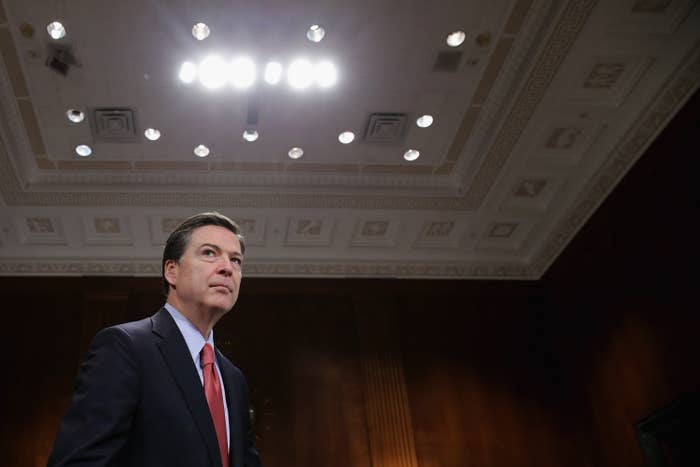
FBI Director James Comey said Wednesday that the San Bernardino shooters did not convey support for jihad on social media posts, but rather in private emails and messages before the attack.
Shooters Tashfeen Malik and Syed Rizwan Farook "were communicating online, showing signs of commitment to jihad. Those communications are direct private messages. We have found no evidence of posting on social media," Comey said at an event with the New York Police Department.
"We don't intercept communication of Americans. We're not combing through their emails," Comey said.
Ultimately, though, Comey's comments on Wednesday were vague. There are reportedly two sets of posts in question:
On Saturday, the New York Times reported that Malik " talked openly on social media about her views on violent jihad" years ago. She later entered the U.S. on a visa for people engaged to be married.
After the attacks, Facebook said it spotted an account that included an apparently public post, from Malik, praising ISIS. Facebook said it removed the account for violating the company's community standards.
At Wednesday's event, Comey said Malik and Farook were communicating online in late 2013 about jihad. "We have found no evidence of the posting on social media by either of them at that period of time and thereafter reflecting their commitment to jihad or to martyrdom," he said.
Here's a rough transcript:
As I have said before, we can see from our investigation that in late 2013—before there is a physical meeting of these two people, resulting in their engagement and journey to the United States—they are communicating online. Showing signs in that communication their joint commitment to jihad and to martyrdom. Those communications are direct private messages. So far in this investigation we have found no evidence of the posting on social media by either of them at that period of time and thereafter reflecting their commitment to jihad or to martyrdom.
Later Wednesday, though, An FBI spokesman said that Comey "was only referring to the time period before the shooting, and describing how direct private messages between the subjects would not have been apparent to a wider audience."
He added that the FBI has not "commented on media reports that the subjects posted claims of allegiance online after the shooting, as this remains an ongoing investigation."
A Facebook official on Wednesday said the company is standing by its comments and that Comey was referring to messages made years ago, not the post as the shooting was happening.
Comey said Wednesday that all communication was in private, direct messages, and any reports to the contrary are "a garble."
He added that neither shooter showed any "indication of direct contact with foreign terrorist" organizations, he said, adding there was "no evidence that they are part of organized cell of any sort."
In his address, Comey said ISIS has "revolutionized" terrorism by inspiring small-scale attacks carried out by individuals around the world through social media and encrypted mobile messaging apps.
"Twitter works as a way to sell books, as a way to promote movies, and it works as a way to crowdsource terrorism — to sell murder," Comey said of the group's use of social media.
The encrypted messaging apps pose a significant challenge for investigators, Comey said, as the need for a safe internet is "crashing into" the need for public safety. Comey said law enforcement officials can't read encrypted messages even when they have court orders giving them permission to access the devices.
When members of ISIS talk online via these apps, "that needle in the haystack goes invisible to us," Comey said. "They go dark."
The FBI director recognized a growing fear of a terror attack in the country but said people should "channel fear into something healthy," calling for the public to develop a "state of awareness," that will improve communication between communities and law enforcement agencies.
This is a developing story. Check back for updates and follow BuzzFeed News on Twitter.
